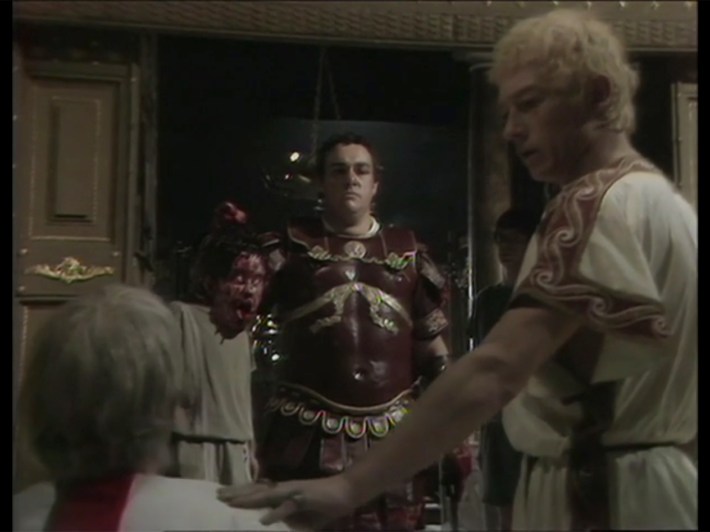In PRESTIGE PREHISTORY, Pop Heist critic Sean T. Collins takes a look at classic TV shows that paved the way for the New Golden Age of Television — challenging, self-contained series from writers and filmmakers determined to push the medium forward by telling stories their own way.
I, Claudius Episode 9
"Zeus, by Jove!"
Original Airdate: November 8, 1976
Writer: Jack Pulman (based on the novels I, Claudius and Claudius the God by Robert Graves)
Director: Herbert Wise
Cast: Derek Jacobi, John Hurt, Margaret Tyzack, Beth Morris, John Rhys-Davies, James Faulkner, Jon Laurimore, Douglas Melbourne
"I said I would reveal everything, and I shall. I shall hide nothing. Nothing! And if what comes next may seem incredible, believe it. Believe it!" —Emperor Claudius
The headline of this review is no joke. Nor is it the first time I've written that combination of words. In prepping to cover this episode of I, Claudius — taking notes, snagging screenshots — I instinctively tried to write "I, Caligula" in at least half of those filenames. In every sense of the phrase, his hour has come.
I'm not sure I can take much more than an hour. Though it's given the playful title "Zeus, by Jove!" — after Caligula's insistence that he is the king of the Greek gods reborn, certainly not Rome's inferior Temu version — it's the most overtly horrific episode of I, Claudius yet.
It doesn't start that way. After the usual framing device, in which an angrier than usual old Emperor Claudius vows to tell us the whole truth and nothing but the truth, we pick up the action five years after the bloodbath that brought the reign of the secret police chief Sejanus to an end last episode. Decrepit old Tiberius has finally died after five more years in semi-retirement, "entirely given up to his perversions." Caligula eagerly removes his ring of office and proclaims himself Emperor to the senators gathered outside.
Okay, so there's a brief hiccup — Tiberius isn't really dead, he was just resting — but Caligula's captain of the guard Macro grabs a pillow, puts it over the old man's face, and hey, we're back in business. "Gentlemen, Tiberius Claudius is definitely dead," Caligula assures them after he and Macro do their dirty work. "No question of it." It's straight-up Monty Python stuff.
But as the episode progresses, the black comedy gets a little less comedic and a little more black with every step. Caligula, we quickly learn, suffers from debilitating headaches, during which his mind fills with a roar like thundering hooves that he takes as the Furies, sent by the God Augustus to torment Tiberius. At this stage, though, it's not clear how much Caligula's delusions of grandeur are things he really believes and how much they're a show put on for his audience of lickspittle senators and aristocrats.
After the worst of these headaches upon his entrance to Rome brings on a seizure and a coma, though, there's no question anymore. When Caligula awakes, he's transformed, just not in the way he thinks he is. Caligula believes he has undergone "a metamorphosis" — "a meta-morPHOsis," as Macro mangles it when explaining it to the Senate. He is now a god, and not just any god: He is Zeus, Lord of Heaven, greatest of all deities. His sister-lover, Drusilla (Beth Morris)? She's a god now too.

Since he makes these announcements with his sword at Claudius' throat, what can he do but go along with it? To paraphrase Ghostbusters, when someone asks you if they're a god, you say yes!
Claudius here makes a rare, profound, fatal (though not for him) miscalculation. When the perpetually bemused Herod tells his old friend that Caligula's ascension to godhood is "bad news for us mortals," Claudius disagrees. The moment the Senate sees what a nut he's become, they'll recognize he's unfit and remove him from office. Here you can picture that meme of Anakin Skywalker and Padmé Amidala: they remove him from office, right?
The political subplot that follows is another example of Robert Graves, Jack Pulman, and Herbert Wise seeing 50-90 years into the future. A senator named Lentulus (John Laurimore) takes it upon himself to be Caligula's number-one glazer. Sure, it's unusual for a man to become a god while still alive, he says, but hey, what a time to be alive, then! Rather than reject his insanity, the Senate and the rest of the Roman elites accommodate it in every way.
The implication that they do so if they know what's good for them is as obvious now as it's been ever since the relatively benign Augustus was granted absolute power. Tiberius, and by extension Sejanus, used that power viciously, but not without planning and purpose. Only now that absolute power is in the hands of a truly insane person do we see what an abomination the very concept of absolute power really is.
Caligula's behavior makes it easy, since the godly shape taken by his delusion serves as a perfect metaphor for Rome's devolution into despotism. Since the coming of the Caesars, the power of a god has been concentrated in the hands of a single man. Now such a man literally believes he is a god, revealing the obscenity and folly of the imperial office. A human being should rightfully no more have the ability to decide the fate of both individuals and nations on a whim than he does to transform into a swan or a bull or throw thunderbolts from the top of Olympus.

Yet this is the madness Rome has long embraced, as the unsympathetic but not wrong Antonia, now an old woman, repeatedly proclaims. Her son Germanicus — one of Caligula's first victims, as he gleefully explains to Germanicus' brother, his own uncle Claudius — was the last Roman, she says. You'll recall that Germanicus turned down the role of Emperor when his legions wanted it for him, since he believed in the return of the Republic.
So disgusted does she become with Caligua's rampage through all common human decency — more on this to come, regrettably — and Roman society's complicity in it that at long last, this proud, deeply unpleasant woman resolves to kill herself. (She says she should have done it years earlier, when she killed her daughter Livilla for her murderous degeneracy.)
Crying despite her years of cruelty towards him — he is, at heart, a huge sap — Claudius begs her to reconsider, since many people believe Caligula's mental illness will resolve itself one way or the other. Antonia retorts that it's Rome that's sick, "sick to its heart — He's just the rash it's come out in." Sejanus was described in nearly identical terms last episode.
Don't feel too bad for Antonia, though, because the script won't let you. She's mean to Claudius from beyond the grave, where suicides must have their hands severed for religious reasons: She asks a servant to do it even though she'd already told Claudius to, since she doesn't trust him to remember. One final insult.
Antonia is of course disgusted with everything about Caligula, and with his sisters, granddaughters of hers she dismisses as hopelessly degraded now. The crime that inspires her suicide is his worst … so far. Tiberius had a young weak-chested grandson with a sweet tooth named Gemellus (Douglas Melbourne) whom he appointed co-heir before the Senate annulled it upon Caligula's ascent, and the kid's cough drives the Emperor nuts. So nuts, in fact, that he imagines he can hear it at all times even when others cannot. His cure for the boy's condition is to cut off his head, which Macro presents him as proof the deed is done.

Her diagnosis of Rome is correct. In one sense, at least, the ass-kisser Lentulus is correct: When he makes the case for Caligula's godhood, he says that Augustus ascending to divinity after death is partial precedent. Indeed, once you start making men gods for any reason, you've already thrown away your dignity and freedom. The rest is just haggling over timing for the handover.
And in what scholars consider a political precursor to the Leopards Eating People's Faces Party, Lentulus is immediately given cause to repent his service to Caligula's cause. In his zeal to be the new Emperor's most special senator, Lentulus vowed that he'd sacrifice his own life if it meant saving Caligula's. When Caligula emerges from his coma alive, then, he demands that Lentulus make good on his word.
It's for his sister Drusilla that Caligula saves the worst of his madness and depravity. From the moment Caligula awakens from his coma into an ongoing psychotic episode, Drusilla, like Claudius, exists under immediate threat of death should she displease her brother. She never loses sight of this, as she reveals to Claudius well into Caligula's reign of misrule. But she does so while coming onto her uncle, a perverse act that shows how Caligula's intoxicating influence has weakened Drusilla's own grip on both morality and reality.
By the time Caligula reveals himself to her in full Zeus drag — a jump scare that screams slasher or serial killer today — Drusilla is too far gone herself to see what's coming. She's constantly high. She's still clearly aroused both by her sexual relationship with Caligula and the power he's given her as a living goddess. She's pregnant, and she's convinced that Caligula's fear that their child will supplant him effectively Caligula-proofs her.
The exact opposite is true. Caligula brings her to his chambers, where he's replaced his bed with a sprawling, diaphanous hammock resembling one of the clouds of Olympus.

There, he shackles her in golden chains, strips her naked, takes out a knife, carves out their baby, and partially eats it.
The carving and eating take place off screen, but an absolutely horrific scream and the character's bloody mouth afterwards are all we need to hear or see. That, and a shellshocked Caligula's own unheeded warning to his uncle after the deed is done: "Don't go in there," he pleads, voice trembling, as so many characters in so many other horror stories have done, and to as little effect. "Don't go in there."
Fans of Game of Thrones and George R.R. Martin's source novels A Song of Ice and Fire, no doubt, see plenty they recognize about Westeros and its inhabitants in Caligula and his macabre misadventures. Caligula has the pale blond hair of House Targaryen, a dynasty that, as Herod says of the Claudians, produces either great men or madmen. He's in an incestuous, blasphemous relationship with his sister Drusilla (actually the other sisters too), another hallmark of the Targaryens and their native Valyrian culture. A blonde queen fucking her brother immediately puts one in mind of Cersei and Jaime Lannister, too. Caligula himself, of course, is the archetypal Mad King.
Anyone, however, can recognize the prodigious gifts of John Hurt, whose Caligula is one of TV's greatest villains, on a show that's given us one already in Livia. Indeed, it's worth reflecting that with the deaths of Tiberius and Antonia, Herod and Claudius are the only characters left alive from fully the first five episodes. In many ways we're watching a brand new show, and for now at least, it's a one-man show at that.
Boy, is it ever. John Hurt makes a feast of the scenery long before he eats that baby, I'll tell you that much. That quavering voice constantly rises and falls in pitch and intensity as he rants, raves, purrs, screams, rages, cowers, seduces, threatens, smirks, pleads, and repeats his last terrible warning. He does all this while looking like cocaine-psychosis era David Bowie's even sicklier cousin. (Wiggy Stardust?)
Yet there is something charming about the man, or the thing wouldn't work. There's still a slight air of the scamp and the scoundrel about him, the exhibitionist freak and the overgrown child. When he names Claudius his Consul because he honestly has always liked his uncle (even when he's on the verge of killing him), it's endearing. When he argues with statues or makes out with his sister, it's perversely riveting. When he forces Lentulus to make good on his promise and kill himself, it's funny — at least in the way James Comey getting prosecuted by Trump after throwing the 2016 election to him with that dumb fucking letter is funny.
(And when he shouts "And you're not Consul anymore!" at Claudius as his uncle runs away in horror from Gemellus' severed head, that's funny too, the same way this line from The Texas Chain Saw Massacre is funny.)
Most tyrants, it seems, are overgrown children, unable to process the world outside themselves as fully real, unable to understand why they can't have what they want whenever they want it. But these overgrown children have the hatreds and desires of men, and — whether forcibly taken, freely given, or some combination of the two — the power of the gods. What kind of person lurks behind that dark and gilded door? Don't go in there. Don't go in there.

This recap was originally accessible to paid subscribers only, and future recaps in this series are available now for paid subscribers. If you haven't already, consider supporting worker-owned media by subscribing to Pop Heist. We are ad-free and operating outside the algorithm, so all dollars go directly to paying the staff members and writers who make articles like this one possible.






